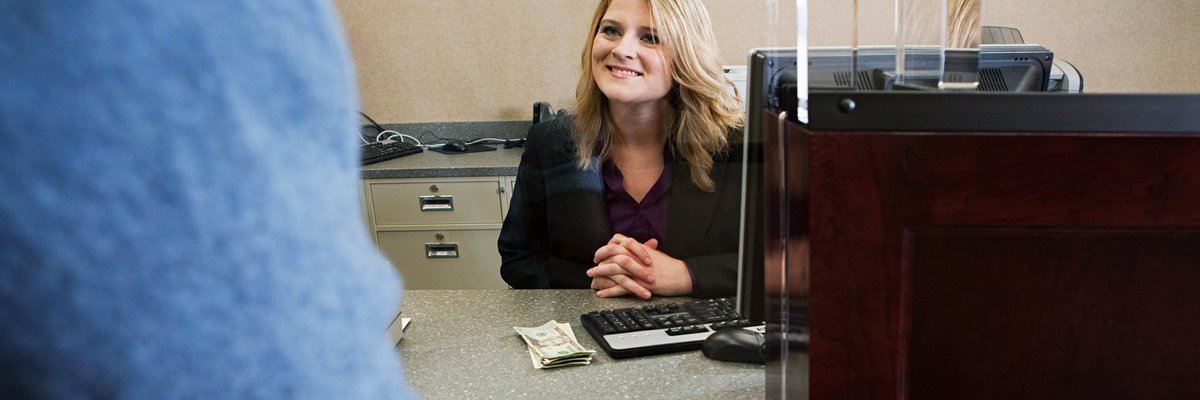Here's What Happens When You Withdraw $10,000+ From Your Bank Account

Image source: Getty Images
Walking into your bank and asking for your own money sounds easy enough. And there's nothing wrong with doing this.
But for withdrawals that cross the $10,000 mark, the transaction takes on a whole new flavor. Banks have reporting rules, extra steps, and sometimes even waiting periods before you get your cash in hand.
Here's everything that happens and how to prepare.
Why banks have to report big withdrawals
Anytime you withdraw $10,000 or more in cold, hard cash, your bank is required by law to file a Currency Transaction Report (CTR).
This isn't about accusing you of doing something wrong. It's about helping regulators track money laundering and fraud.
All reports go to the U.S. Treasury's Financial Crimes Enforcement Network (FinCEN). Then they look at all the data and try to catch the bad guys -- the ones actually breaking the law.
For the record: Withdrawing your own money isn't illegal. You won't face a fine or penalty if you're doing legit cash transactions. But the reporting happens automatically, and it means your transaction might get an extra glance.
What to expect at the branch
If you walk into a bank or credit union and request to pull out $10,000 or more from your checking account, here's what typically happens:
- They check your ID: Even if you've banked there for years, you'll almost always be asked for identification.
- Possible delay: Smaller branches may not keep that much cash in the vault, so the bank may ask you to come back after they order it.
- Friendly questions: Tellers may ask what the cash is for. You don't have to answer specific or personal details, but cooperating can speed things up.
Think of it less like an interrogation and more like your bank double-checking they're doing things by the book.
No extra paperwork is needed on your end. The bank will file their report and you'll probably never hear anything about it again.
By the way, if you're sitting on $10,000 or more and don't need it right away, don't let it just idle in a low-interest account. The LendingClub LevelUp Savings account is offering 4.00% APY with $250+ in monthly deposits -- which means $400+ in interest in just 12 months on a $10,000 balance.
LendingClub LevelUp Savings
On LendingClub's Secure Website.

On LendingClub's Secure Website.
- Competitive APY
- No fees
- Easy ATM access
- Unlimited number of external transfers (up to daily transaction limits)
- Requires you to make monthly deposits to earn the best APY
- ACH outbound transfers limited to $10,000 per day for some accounts
- No branch access; online only
The LendingClub LevelUp Savings account has a lot to offer. At the top of the list is its high APY, though you must deposit monthly to earn the best rate. Next is zero account fees, a strong and straightforward perk. Finally, you get a free ATM card, which you can use to withdraw from thousands of ATMs nationwide. Interested? You can open an account with $0.
Don't get cute with multiple, smaller withdrawals
I know what you're thinking… What if you take out $9,999 to stay under the $10,000 threshold? Or better, why not make two separate $5,000 withdrawals at two different branches?
That's a bad idea. That's called structuring, and it's actually a federal crime. Even if you're innocent, regulators see it as deliberately avoiding the rules.
It's safer to just make the full withdrawal in one clean shot.
Again, it's not illegal to withdraw large amounts of your own money. I've actually done this several times. I withdrew $14,000 once to buy a Prius from someone on Craigslist. At the teller, I just told them the truth -- that I was buying a car. No issues at all, this is a normal thing people do.
Bottom line: It's your money, just know the rules
Taking out $10,000 or more in cash doesn't make you a criminal. It just means your bank has to follow some federal reporting rules.
Expect your ID to be checked, possible delays for massive amounts the bank may not keep at the branch, and maybe a quick chat with the teller.
Always be transparent. Don't try to game the system, and you'll walk away with your cash without trouble.
Don't let your money sit idle in a low-rate checking account. Compare today's top high-yield savings accounts and start earning more.
Our Research Expert




